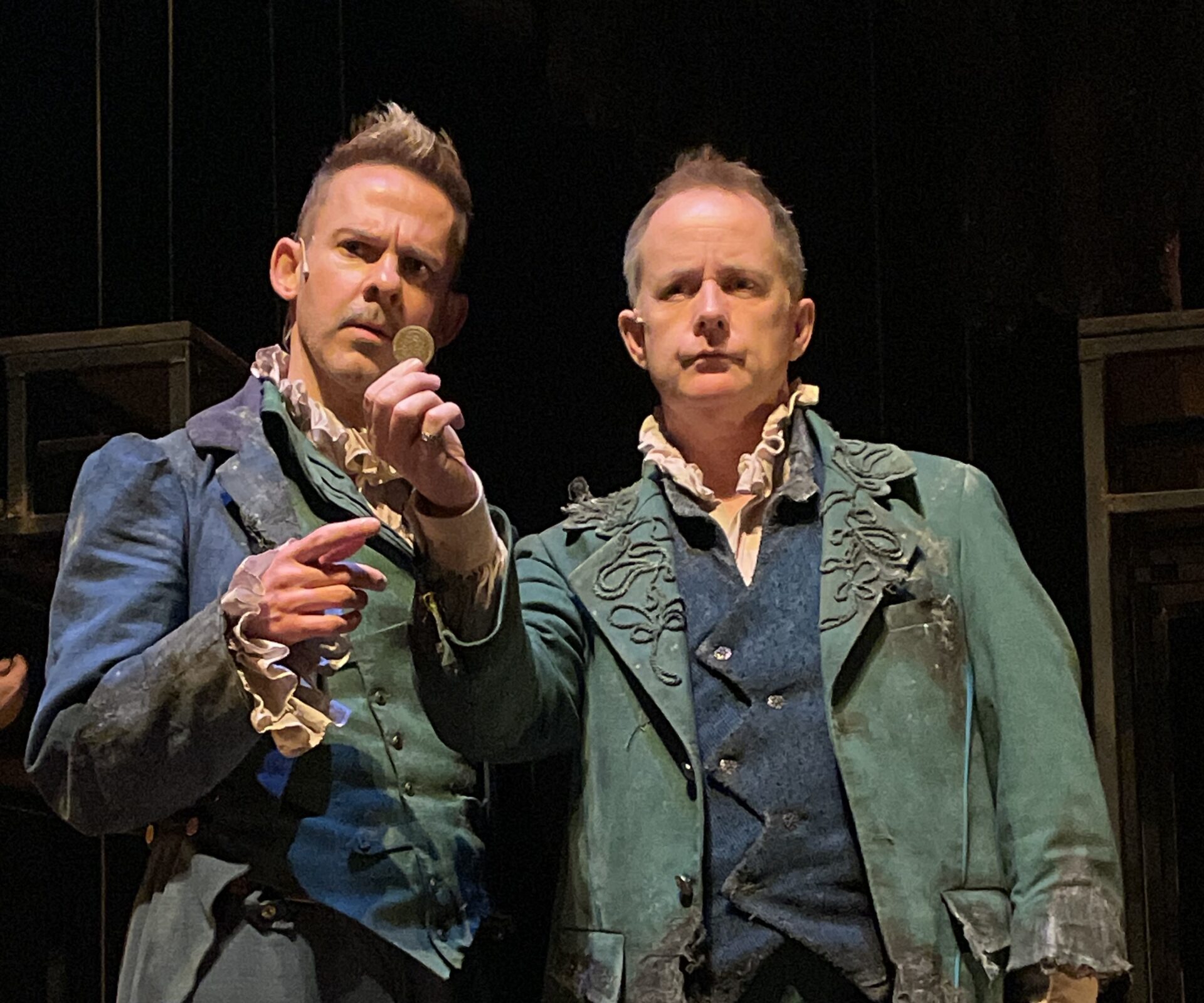
It all began on the set of Peter Jackson’s film The Lord of the Rings: The Two Towers (2002) while Billy Boyd, who played Peregrin “Pippin” Took, and Dominic Monaghan, who played Meriadoc “Merry” Brandybuck, were up in a tree.
“We’re up in a tree, a Walking Tree called Treebeard,” Billy Boyd explains to me as we sit with Dominic Monaghan and Walter Borden in the lower lobby of Neptune Theatre’s Fountain Hall the day after their first preview of Tom Stoppard’s play Rosencrantz and Guilderstern Are Dead, directed by Jeremy Webb. “The actual prop for that was really tall, and they used to hook us in, and it was difficult to come out for a tea break. So, for a fifteen-twenty minute tea break we just said, ‘We’ll just stay up there.’ People would leave, and we would talk about [projects] that we wanted to do, and one of the things that we spoke about was Rosencrantz and Guildenstern.”
It likely never crossed their minds in a million years that they would end up opening this play, after a global pandemic, in Halifax, Nova Scotia, Canada.
What came next is truly an inspiring example of never knowing what is possible until you ask the question, and throw the prospect into the realm of opportunity. Jeremy Webb attended Halifax’s Hal-Con Sci-Fi & Fantasy Convention in 2018, shortly after he was hired as Artistic Director of Neptune, and he attended a Question and Answer segment that Billy Boyd was hosting. In front of a large audience of convention attendees Webb said to Boyd, “I am wondering what theatre role you’ve dreamed of playing, because I can program it- whatever you want.” This was greeted immediately by massive cheers from the crowd.
Over the next little while the two began to chat in earnest.
“I was here working on a TV show,” says Boyd, “and I met Jeremy for a drink, and I was coming to see the play that was on here [at Neptune], and he mentioned Rosencrantz and Guildenstern, and asked if Dom would have any interest. I said, ‘Well, I can always ask him,’ and I called up Dom, and it just sort of went from there.”
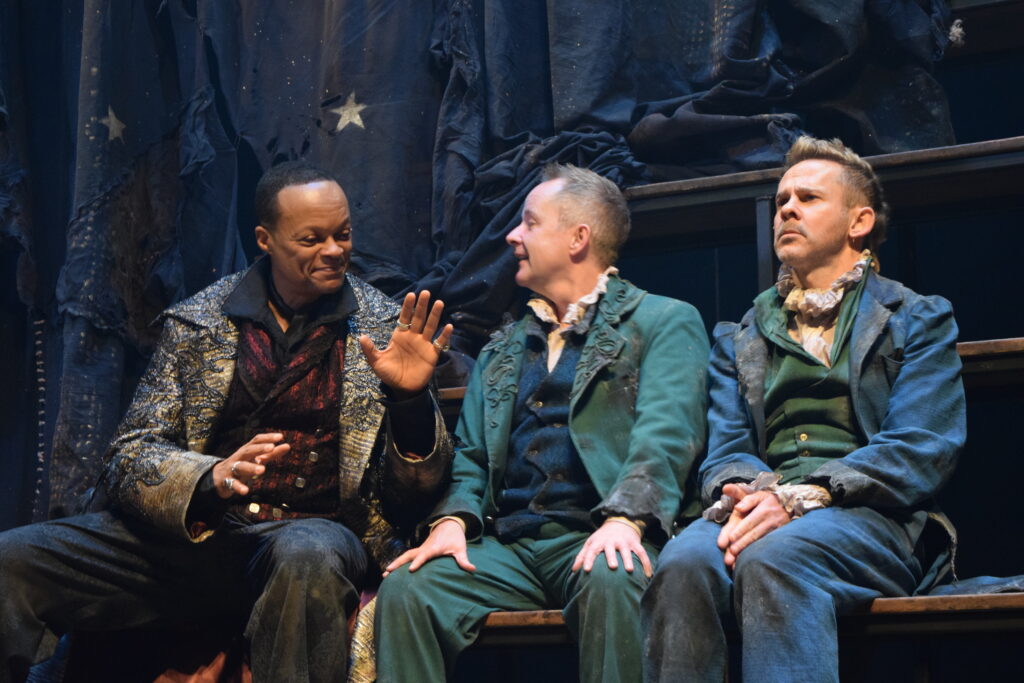
Rosencrantz and Guildenstern Are Dead debuted at the Edinburgh Fringe Festival in 1966, and shines the spotlight on Hamlet’s two courtier friends, Rosencrantz and Guildenstern, depicting some of the same events as in Shakespeare’s Hamlet, but from a radically different perspective. Coincidently, it was turning down the opportunity to play Hamlet in a theatre in the south of England that made Billy Boyd eager to transition from years of doing almost exclusively film and television, back to the theatre.
“I always regretted [turning down Hamlet],” said Boyd, “because I thought, ‘Ah, I think I said no for the wrong reason’, you know? I said no because I was supposed to be doing a film or something, and it made me think you should grab these moments- like Stoppard’s talking about in this play all the time- life is short and you never know when the end of it’s coming. So if you get the chance to do something you want to do and think is fun [you should do it]. That time that I got asked to do Hamlet and I didn’t made me go, ‘ah, I need to readjust a little bit.’”
Dominic Monaghan points out that Sir Ian McKellan played Hamlet at age 82 at the Theatre Royal Windsor. “There’s still time,” he assures his friend.
Their long friendship is also an integral asset to their portrayals of Rosencrantz and Guilderstern, two very close friends often treated as interchangeable, or like twins folks aren’t able to reliably or confidently tell apart, as well as being advantageous for their process as actors.
Monaghan says, “When you’ve been friends for so long, when you know someone that well- you go through great days, you go through days when you’re tired, or you’re upset, and this job is so taxing, it takes so much of your time, and, so much of your energy, if you’re doing it right, so much of yourself, if you’re doing it right, that, if you can choose to share it with someone that will just allow you to just show up and be- as opposed to, if you’re doing a play with somebody you just met a month ago- you might have to say, ‘Oh, hey, I might be a bit quiet today- this is happening.’ But with Billy and I, we’re just fine. However way the other one shows up, we’re like, ‘okay that’s fine. I love you. I know you. Do your thing.’ We know we’re going to help each other out, and it works so well on the stage. If you do a take on a film or a TV show and you make a mess of it, they can yell ‘CUT.’ If you make a mistake on stage, then either you are going to have to figure it out, or your partner is going to have to figure it out for you. Knowing that your partner WILL figure it out for you- is in a headspace where they WANT to figure it out- is a huge weight off your mind.” He cites in particular Stoppard’s dialogue in this play, which he calls, “purposefully bamboozling and confusing,” as being an instance where knowing your scene partner is on your side is especially beneficial.
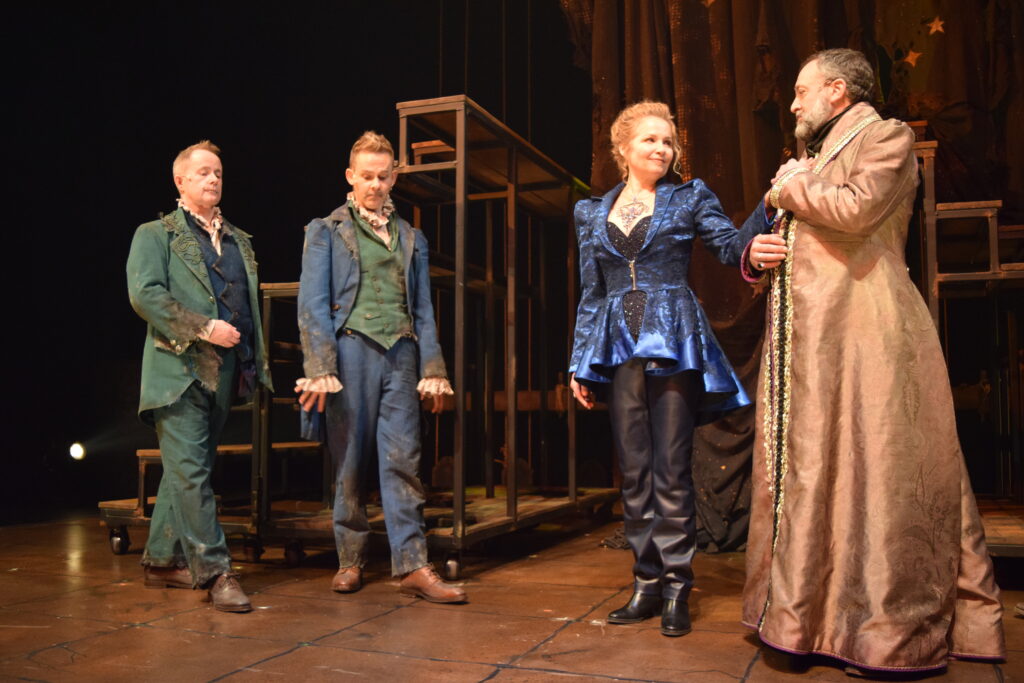
In addition to Boyd and Monaghan the cast for Rosencrantz and Guilderstern Are Dead includes a stacked ensemble filled with many local and returning actors. Dartmouth’s own Raquel Duffy plays Tragedian/Gertrude in her return to Fountain Hall for the first time since the 2005-2006 Season when she was in Frozen by Brian Lavery. Jacob Sampson, 2b Theatre’s new Associate Artistic Director, plays Tragedian/Laertes. Walter Borden, last seen onstage here in 2022 in his own Tour de Force play The Last Epistle of Tightrope Time, plays a Tragedian/Polonius. Also onstage are Drew Douris-O’Hara: Artistic Associate of Shakespeare By the Sea, Mallory Amirault, who was in Pawâkan Macbeth earlier this season, as well as a slew of other incredible artists, both from here and elsewhere in the country.
Of the cast Raquel Duffy, who has had a prolific career since getting her Equity Card at Neptune in 1991, and has been based in Ontario since 2007 working primarily as a resident artist at Soulpepper Theatre, as well as at the Stratford Festival says, “Everyone in this cast is amazing. Everyone. I feel like it’s an amazing group of people. [Everyone is] so talented.” Jacob Sampson agrees, “I’m so overjoyed every day to come in and, literally, I’m walking away with at least internal notes, internal monologues, watching people who you can tell when they drop into these roles- like Raquel, like Johnny (Jonathan Ellul), that Shakespeare is in them. Watching Billy and Dom- you see twenty years of friendship in the way they play- in Michael [Blake] you see a true lived Player. So, every day I’m walking away with notes that, as an actor, this is what it’s all about. We stop school, but the training never stops. So, to be encircled by this much true- not just talent, but a work ethic that is admirable, and a generosity of spirit, and generosity of artistry- I’m learning every day. It’s beautiful.”
Boyd and Monaghan have said that they were able to choose which character in this show they wanted to play, and that they deliberately chose the character that went against their own type and inclination, choosing instead the character that was more dissimilar to the respective hobbits they are known for playing in Lord of the Rings, and were further from their own personalities in real life.
“For me they are sort of different ways of looking at life,” says Boyd, “Rosencrantz is more relaxed about life, and Guildenstern is more asking questions all the time, trying to work things out, and because of that makes himself sadder than the person who is able to go, ‘okay- wheels are turning, we’ll just see what happens.’”
Monaghan agrees, “They have so many lines, Rosencrantz and Guildenstern, so there’s so many lines that come to define who they are in a way, but the moment- the line- that I’m kind of the most interested in with Rosencrantz is coming towards the end of the play, Rosencrantz turns to Guildenstern and says, ‘Be happy, if you’re not happy, what’s so good about surviving?’ And I think that encapsulates a lot about how he feels about stuff. It’s quite hobbity, actually, which I thought about today: am I happy in this space right now? Am I in danger? No. Am safe? Am I warm? Am I well fared? Am I in a place where I can kind of enjoy myself? Yes. In that case, everything’s fine. The future is something I can’t predict. I don’t know. The past is behind me. I think Rosencrantz does live in a place of, ‘I’m with you, you’re safe, I’m safe, let’s just do our best.’ But Guildenstern is like, ‘no, we’re in danger, we’re in trouble…’ They’re sort of at odds with each other in that sense. But that’s what makes it interesting, because I think they both learn things about each other going through the play and, obviously, meeting these different characters in the Hamlet play also shakes them up as well.”
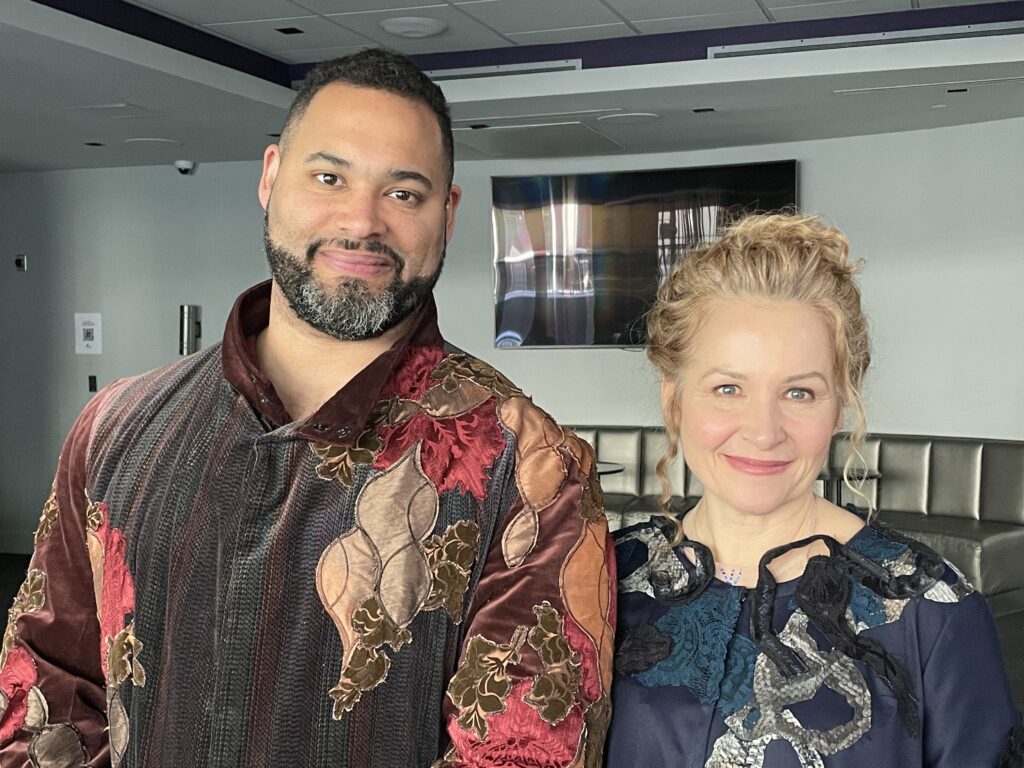
The other characters are members of a theatre troupe heading to Hamlet’s home of Elsinore to perform the now-famous play The Mousetrap for the court there. “I play a tragedian- part of this acting troupe,” explains Raquel Duffy, “and then on top of that I play Gertrude, Hamlet’s mother, and these scenes from [Shakespeare’s Hamlet] come into Rosencrantz and Guildenstern’s world, so they come to life through the tragedians.” Sampson adds, “We are coming to drive the action around Rosencrantz and Guildenstern. It’s really really fun to to play… it’s almost like playing the fates from the Greek mythos. When something needs to happen then all the sudden: there we are to make it happen. I find it really beautiful to play that spritely character that lives in the in-between- playing in that liminal space. Whether or not we know we’re playing in it is also fun to play with as an actor.” “How I imagine it,” says Duffy, “we’re the theatre. We are the ghosts of all the actors who have ever played in this space, and we’ve sort of come out of the woodwork into life in order to move the story forward.”
“I think that, for me [the play is] about theatre,” says Sampson, “and what we have chosen to do- the stories that we choose to tell, and how they get told, and how these characters are living over and over and over: stories about love, and loss, and life and death, and friendship and relationship… and, particularly in this production, you’re seeing the actual theatre come to life around these two characters [of Rosencrantz and Guildenstern].”
Both Duffy and Boyd mention that one of Stoppard’s central themes is asking, “what is choice, and what is fate?” and both mention how brilliant it is that these themes are explored through Stoppard’s sharp and intelligent sense of humour. Boyd also points out that while the audience is aware of Rosencrantz and Guildenstern’s eventual fate, Stoppard is also reminding all of us of our own mortality, but through comedy.
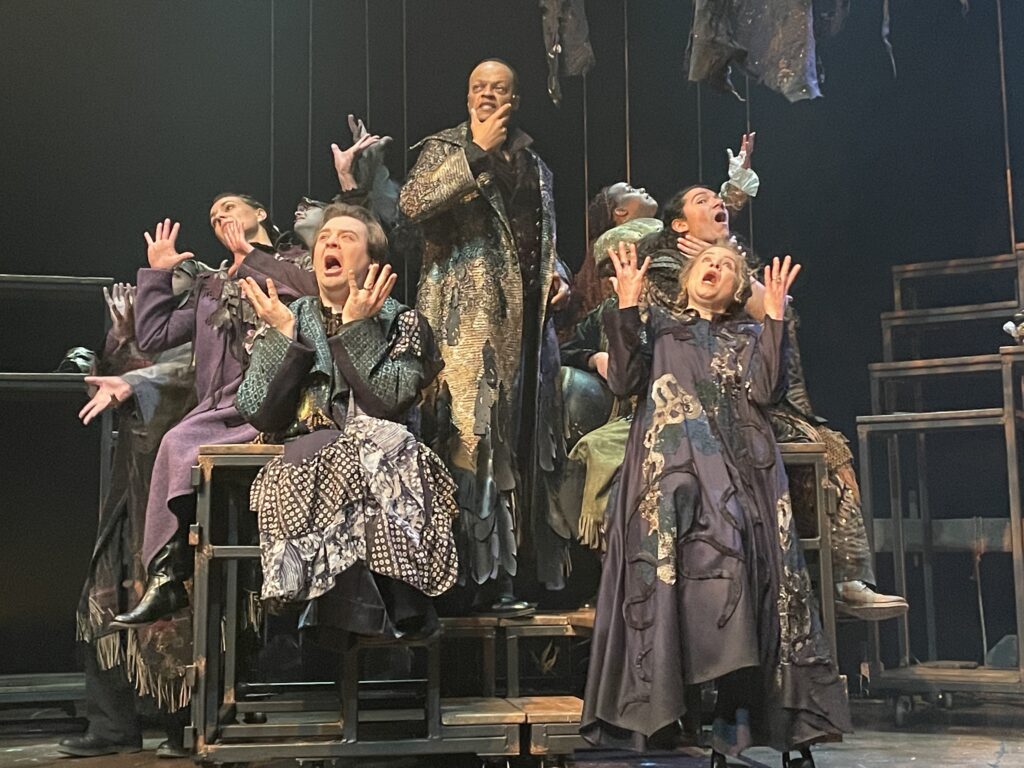
I can’t help but be struck by how fateful it feels for us all to be siting here in this theatre together today, pulled from our very different respective lives, and brought together by a leap of hopefulness, optimism, and aplomb by Jeremy Webb at a Science Fiction convention. “It’s happened when it’s supposed to happen,” says Walter Borden of the production, and Monaghan agrees. The play is already having profound effects on audience members. Monaghan recounts, “We had a little note session last night after the play… and the first thing Jeremy said when he arrived to address all the actors was that he had been stopped on the way down to see us by an audience member, a young man, who said, ‘I’m thinking differently about my life now. I’m realizing that life is short, and we’re not living on this Earth for too long, and I’ve wanted to be an actor. I’m going to make some changes, and hopefully I can do something with you [someday].”
As the fates have brought them to a snowy January in Halifax, both Boyd and Monaghan have been enjoying their time here so far, cite the friendliness of the locals, and wish they had more time off to do some sightseeing, to check out the music scene, and, perhaps maybe even to do some winter surfing at Lawrencetown Beach. Both learned how to surf in New Zealand (a far cry from Lawrencetown), but Boyd has done some winter surfing in his native Scotland.
“It’s a lot,” he says, “to put on the helmet, and the gloves…”
“I prefer [surfing in] Costa Rica,” Monaghan interjects.
I feel like Jeremy Webb will be relieved. On Friday night Rosencrantz and Guildenstern Are Dead opens at Neptune Theatre, and like Tom Stoppard’s dialogue, this incredible story will have come full circle.
Rosencrantz and Guildenstern Are Dead opens Friday February 2nd, 2024 at Neptune Theatre’s Fountain Hall (1593 Argyle Street) and plays there until February 25th. Shows run Tuesday to Friday at 7:30pm and Saturday and Sunday at both 2:00pm and 7:30pm. The show is nearly entirely sold-out, but there are still some single tickets available. Tickets range in price from $44.00 to $119.00 based on seating.
For tickets please visit this website, or call the Box Office at 902.429.7070 or visit in person at 1593 Argyle Street. This show is approximately 170 minutes, including 2 intermissions (Act 1: 50 minutes; Act 2: 58 minutes; Act 3: 37 minutes). Babes in arms & children under 4 are not permitted in the theatre. Please note: this show contains fog, haze, implied violence, brief references to suicide & sexual violence. Pirates can happen to anyone. No photos or recordings.
SUPPORT FOR CULTURE
INDUSTRY NIGHT:
Tuesday, February 6 – 7:30pm
TALK BACK NIGHT:
Tuesday, February 13 – 7:30pm
AUDIO DESCRIBED PERFORMANCE
Saturday, February 24 – 2:00pm
MASKED PERFORMANCES:
Sunday, February 11 – 2:00 pm & 7:30 pm
Neptune Theatre is fully accessible for wheelchair users. For more Accessibility Information Click Here.




 World Theatre Day: My God Is It Ever The Time to Invest in Canadian Plays
World Theatre Day: My God Is It Ever The Time to Invest in Canadian Plays 

